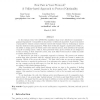Free Online Productivity Tools
i2Speak
i2Symbol
i2OCR
iTex2Img
iWeb2Print
iWeb2Shot
i2Type
iPdf2Split
iPdf2Merge
i2Bopomofo
i2Arabic
i2Style
i2Image
i2PDF
iLatex2Rtf
Sci2ools
PODC
2015
ACM
2015
ACM
How Fair is Your Protocol?: A Utility-based Approach to Protocol Optimality
In his seminal result, Cleve [STOC’86] established that secure distributed computation— guaranteeing fairness—is impossible in the presence of dishonest majorities. A generous number of proposals for relaxed notions of fairness ensued this seminal result, by weakening in various ways the desired security guarantees. While these works also suggest completeness results (i.e., the ability to design protocols which achieve their fairness notion), their assessment is typically of an all-or-nothing nature. That is, when presented with a protocol which is not designed to be fair according to their respective notion, they most likely would render it unfair and make no further statement about it. In this work we put forth a comparative approach to fairness. We present new intuitive notions that when presented with two arbitrary protocols, provide the means to answer the question “Which of the protocols is fairer?” The basic idea is that we can use an appropriate utility function to e...
| Added | 16 Apr 2016 |
| Updated | 16 Apr 2016 |
| Type | Journal |
| Year | 2015 |
| Where | PODC |
| Authors | Juan A. Garay, Jonathan Katz, Björn Tackmann, Vassilis Zikas |
Comments (0)

